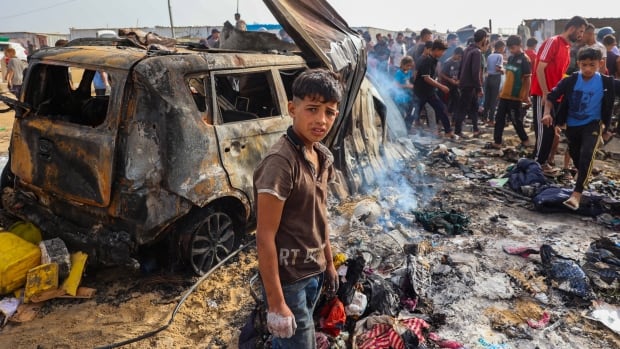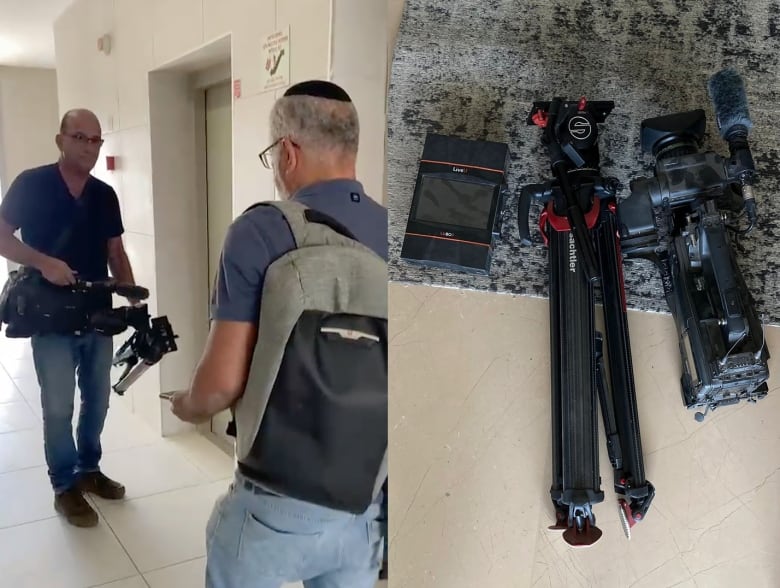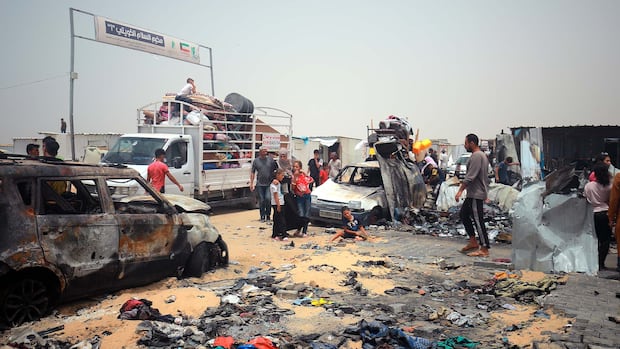
Warning: This story contains a photograph showing the body of a Palestinian journalist killed in Gaza.
Israel’s brief seizure of The Associated Press’s video equipment last week may have proven to be a step too far in that government’s limiting of press freedoms amid the war in Gaza.
As international condemnation mounted, Communications Minister Shlomo Karhi quickly reversed course and ordered the return of the AP’s equipment, which was used to broadcast a live feed looking into the Gaza Strip from southern Israel. He cited a recent law that was just used to temporarily bar the news network Al Jazeera from operating in the country.
The move highlighted the Israeli government’s attempts to control information — already a problem prior to the start of the war, said Anat Saragusti, press freedom director for the Union of Journalists in Israel.
“The extreme right-wing government of Israel, from the beginning of its term … put the freedom of [the] press as a target,” she told CBC News in an interview from Tel Aviv.

But the situation has dramatically worsened since the outset of the war. Both foreign and Israeli journalists are prohibited from entering Gaza without strictly controlled military embeds, while Palestinian journalists risk death to document what’s happening on the ground.
More than 100 Palestinian journalists have been killed so far in Israel’s eight-month offensive, according to the New York-based Committee to Protect Journalists (CPJ), though other estimates put that toll higher.
Press freedom advocates also warn of self-censorship among mainstream Israeli news outlets, saying they are failing to provide a full picture of the devastating war.
“The world sees a completely different war from the Israeli audience,” Saragusti told CBC News in an interview from Tel Aviv. “This is very disturbing.”
CBC News contacted Israel’s Ministry of Communications for comment on claims that press freedom in the country is eroding and was referred to Prime Minister Benjamin Netanyahu’s office, but did not receive a response in time for publication.
An Israeli airstrike and its aftermath have killed dozens of innocent Palestinians sheltering in tents in the southern Gaza city of Rafah. Prime Minister Benjamin Netanyahu called it a mistake, while international leaders condemned it.
A ‘dangerous precedent’
The Israeli government has had Al Jazeera — which Netanyahu has referred to as a “Hamas mouthpiece” and a “terror channel” — in its sights since the Hamas-led Oct. 7 attack on Israel and the start of Israeli military operations in Gaza.
The attack killed roughly 1,200 people, with about another 250 taken hostage, according to Israeli tallies. Israel’s subsequent ground offensive in Gaza has killed over 35,000 people since then, by Palestinian counts.
Al Jazeera is primarily funded by the Qatari government and has been critical of Israel’s operation in Gaza, from where it has reported around the clock throughout the war.
Israel adopted a new law in April that allowed it to temporarily ban Al Jazeera, and any other “foreign broadcast networks deemed a national security risk.”
On May 5, the government shut down the network’s operations in the country and blocked access to its Arabic and English channels and websites. The measure is in place for 45 days, but can be renewed.
Karhi shared video of police and government officials raiding Al Jazeera’s office at a hotel in occupied East Jerusalem.
סוגרים את אלג׳זירה🇮🇱<br><br>פקחי משרד התקשורת בגיבוי משטרת ישראל פושטים בשעה זו על משרדי אלג׳זירה בירושלים ומחרימים את צי
